Leadership and Management Report: Hazev, Haz and Tas Restaurants
VerifiedAdded on 2020/12/29
|8
|2160
|364
Report
AI Summary
This report provides a detailed analysis of leadership and management principles within the service industry, using Hazev, Haz, and Tas restaurants as a case study. It explores classical management theories such as scientific and bureaucratic management, and examines the roles of leaders and various leadership styles, including autocratic and democratic approaches. The report delves into internal and external factors influencing management styles, such as company culture, manager personality, political and economic factors, and the impact of digital technology. It also identifies current and future management skills, differentiating between hard and soft skills, and assesses change management systems and leadership approaches in comparison to other service industry organizations like Ledbury. The conclusion emphasizes the significance of adapting management and leadership styles, considering internal and external factors, and embracing digital technology to foster growth and success within the service sector. All of this is available on Desklib, a platform providing AI-powered study tools.
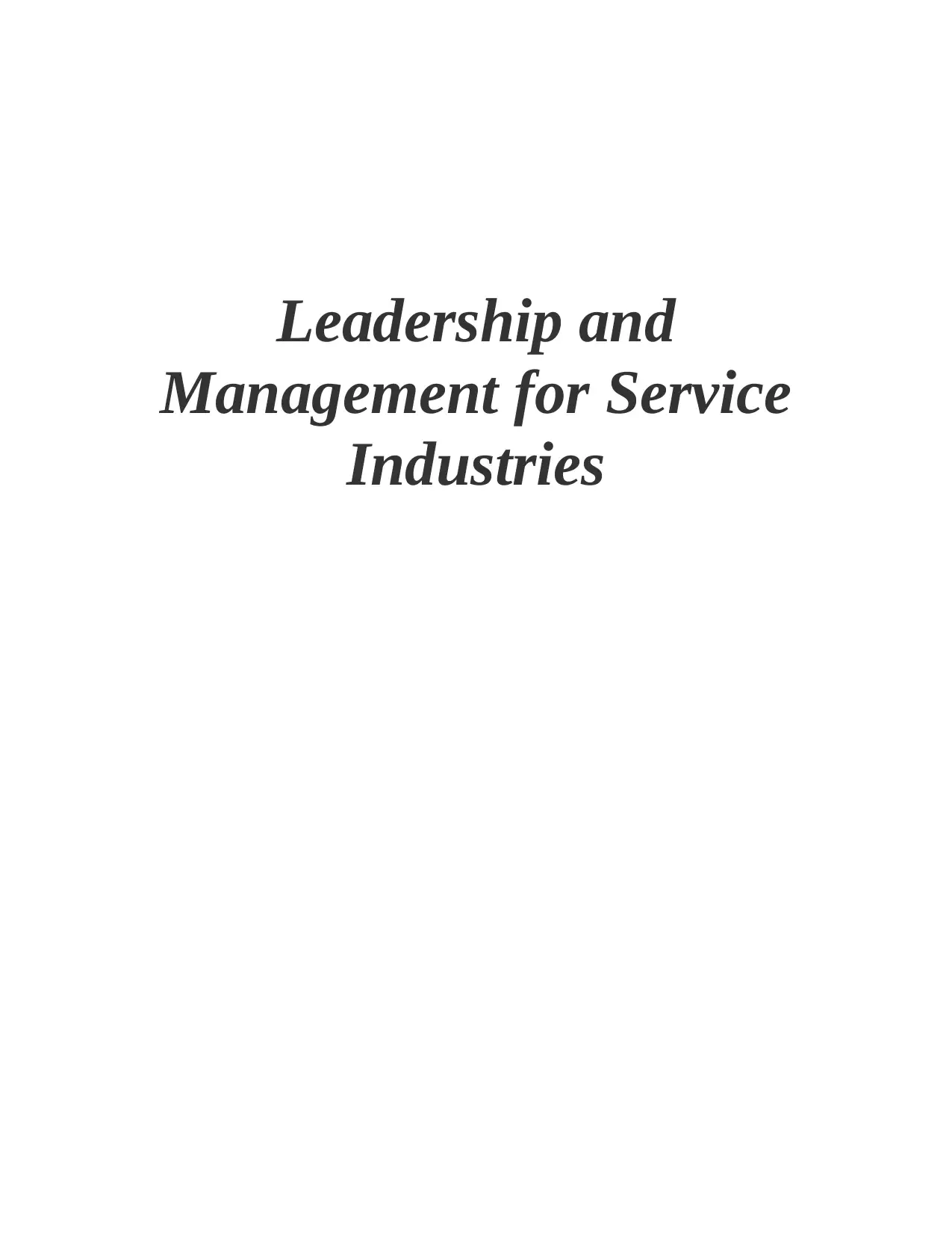
Leadership and
Management for Service
Industries
Management for Service
Industries
Paraphrase This Document
Need a fresh take? Get an instant paraphrase of this document with our AI Paraphraser
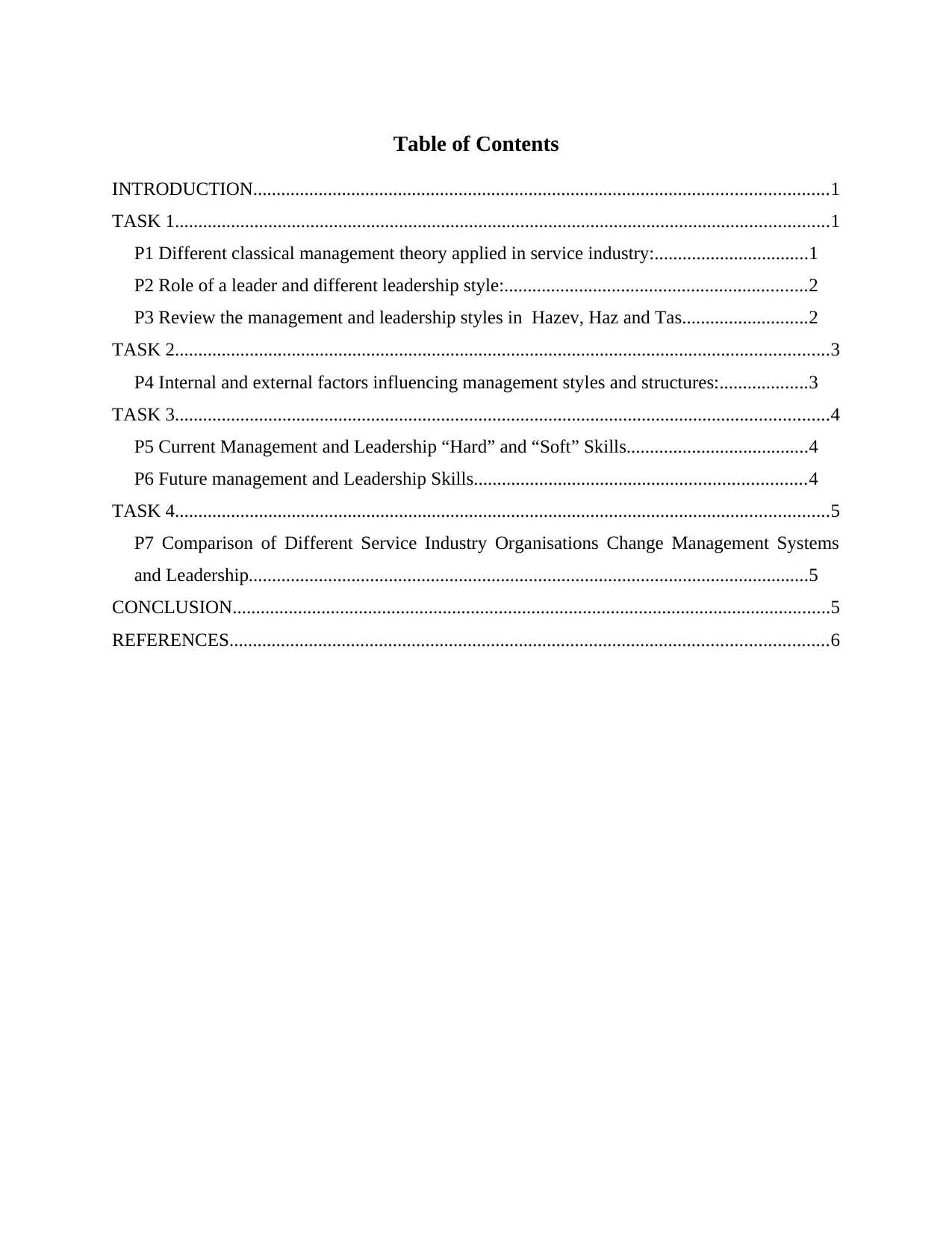
Table of Contents
INTRODUCTION...........................................................................................................................1
TASK 1............................................................................................................................................1
P1 Different classical management theory applied in service industry:.................................1
P2 Role of a leader and different leadership style:.................................................................2
P3 Review the management and leadership styles in Hazev, Haz and Tas...........................2
TASK 2............................................................................................................................................3
P4 Internal and external factors influencing management styles and structures:...................3
TASK 3............................................................................................................................................4
P5 Current Management and Leadership “Hard” and “Soft” Skills.......................................4
P6 Future management and Leadership Skills.......................................................................4
TASK 4............................................................................................................................................5
P7 Comparison of Different Service Industry Organisations Change Management Systems
and Leadership........................................................................................................................5
CONCLUSION................................................................................................................................5
REFERENCES................................................................................................................................6
INTRODUCTION...........................................................................................................................1
TASK 1............................................................................................................................................1
P1 Different classical management theory applied in service industry:.................................1
P2 Role of a leader and different leadership style:.................................................................2
P3 Review the management and leadership styles in Hazev, Haz and Tas...........................2
TASK 2............................................................................................................................................3
P4 Internal and external factors influencing management styles and structures:...................3
TASK 3............................................................................................................................................4
P5 Current Management and Leadership “Hard” and “Soft” Skills.......................................4
P6 Future management and Leadership Skills.......................................................................4
TASK 4............................................................................................................................................5
P7 Comparison of Different Service Industry Organisations Change Management Systems
and Leadership........................................................................................................................5
CONCLUSION................................................................................................................................5
REFERENCES................................................................................................................................6
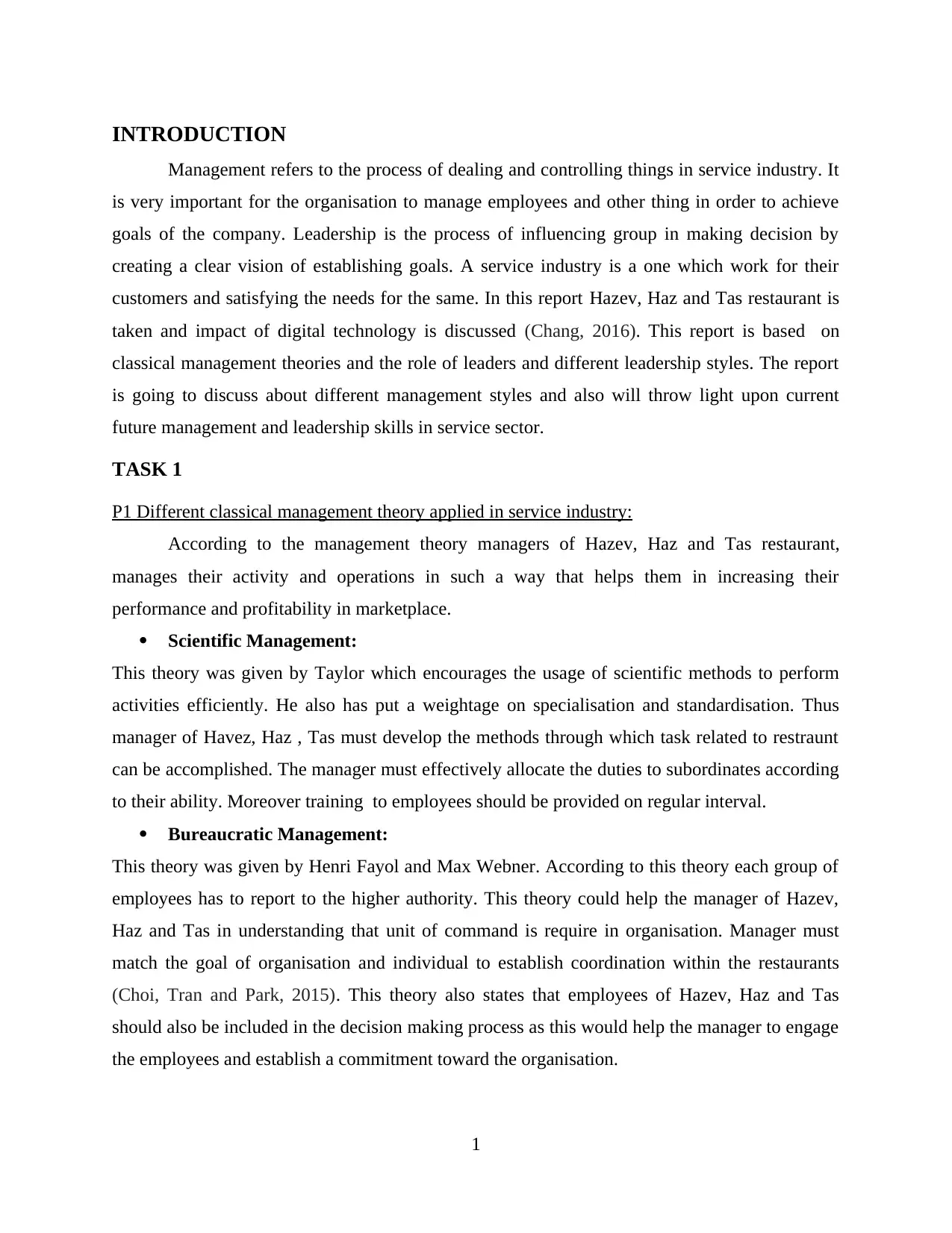
INTRODUCTION
Management refers to the process of dealing and controlling things in service industry. It
is very important for the organisation to manage employees and other thing in order to achieve
goals of the company. Leadership is the process of influencing group in making decision by
creating a clear vision of establishing goals. A service industry is a one which work for their
customers and satisfying the needs for the same. In this report Hazev, Haz and Tas restaurant is
taken and impact of digital technology is discussed (Chang, 2016). This report is based on
classical management theories and the role of leaders and different leadership styles. The report
is going to discuss about different management styles and also will throw light upon current
future management and leadership skills in service sector.
TASK 1
P1 Different classical management theory applied in service industry:
According to the management theory managers of Hazev, Haz and Tas restaurant,
manages their activity and operations in such a way that helps them in increasing their
performance and profitability in marketplace.
Scientific Management:
This theory was given by Taylor which encourages the usage of scientific methods to perform
activities efficiently. He also has put a weightage on specialisation and standardisation. Thus
manager of Havez, Haz , Tas must develop the methods through which task related to restraunt
can be accomplished. The manager must effectively allocate the duties to subordinates according
to their ability. Moreover training to employees should be provided on regular interval.
Bureaucratic Management:
This theory was given by Henri Fayol and Max Webner. According to this theory each group of
employees has to report to the higher authority. This theory could help the manager of Hazev,
Haz and Tas in understanding that unit of command is require in organisation. Manager must
match the goal of organisation and individual to establish coordination within the restaurants
(Choi, Tran and Park, 2015). This theory also states that employees of Hazev, Haz and Tas
should also be included in the decision making process as this would help the manager to engage
the employees and establish a commitment toward the organisation.
1
Management refers to the process of dealing and controlling things in service industry. It
is very important for the organisation to manage employees and other thing in order to achieve
goals of the company. Leadership is the process of influencing group in making decision by
creating a clear vision of establishing goals. A service industry is a one which work for their
customers and satisfying the needs for the same. In this report Hazev, Haz and Tas restaurant is
taken and impact of digital technology is discussed (Chang, 2016). This report is based on
classical management theories and the role of leaders and different leadership styles. The report
is going to discuss about different management styles and also will throw light upon current
future management and leadership skills in service sector.
TASK 1
P1 Different classical management theory applied in service industry:
According to the management theory managers of Hazev, Haz and Tas restaurant,
manages their activity and operations in such a way that helps them in increasing their
performance and profitability in marketplace.
Scientific Management:
This theory was given by Taylor which encourages the usage of scientific methods to perform
activities efficiently. He also has put a weightage on specialisation and standardisation. Thus
manager of Havez, Haz , Tas must develop the methods through which task related to restraunt
can be accomplished. The manager must effectively allocate the duties to subordinates according
to their ability. Moreover training to employees should be provided on regular interval.
Bureaucratic Management:
This theory was given by Henri Fayol and Max Webner. According to this theory each group of
employees has to report to the higher authority. This theory could help the manager of Hazev,
Haz and Tas in understanding that unit of command is require in organisation. Manager must
match the goal of organisation and individual to establish coordination within the restaurants
(Choi, Tran and Park, 2015). This theory also states that employees of Hazev, Haz and Tas
should also be included in the decision making process as this would help the manager to engage
the employees and establish a commitment toward the organisation.
1
⊘ This is a preview!⊘
Do you want full access?
Subscribe today to unlock all pages.

Trusted by 1+ million students worldwide
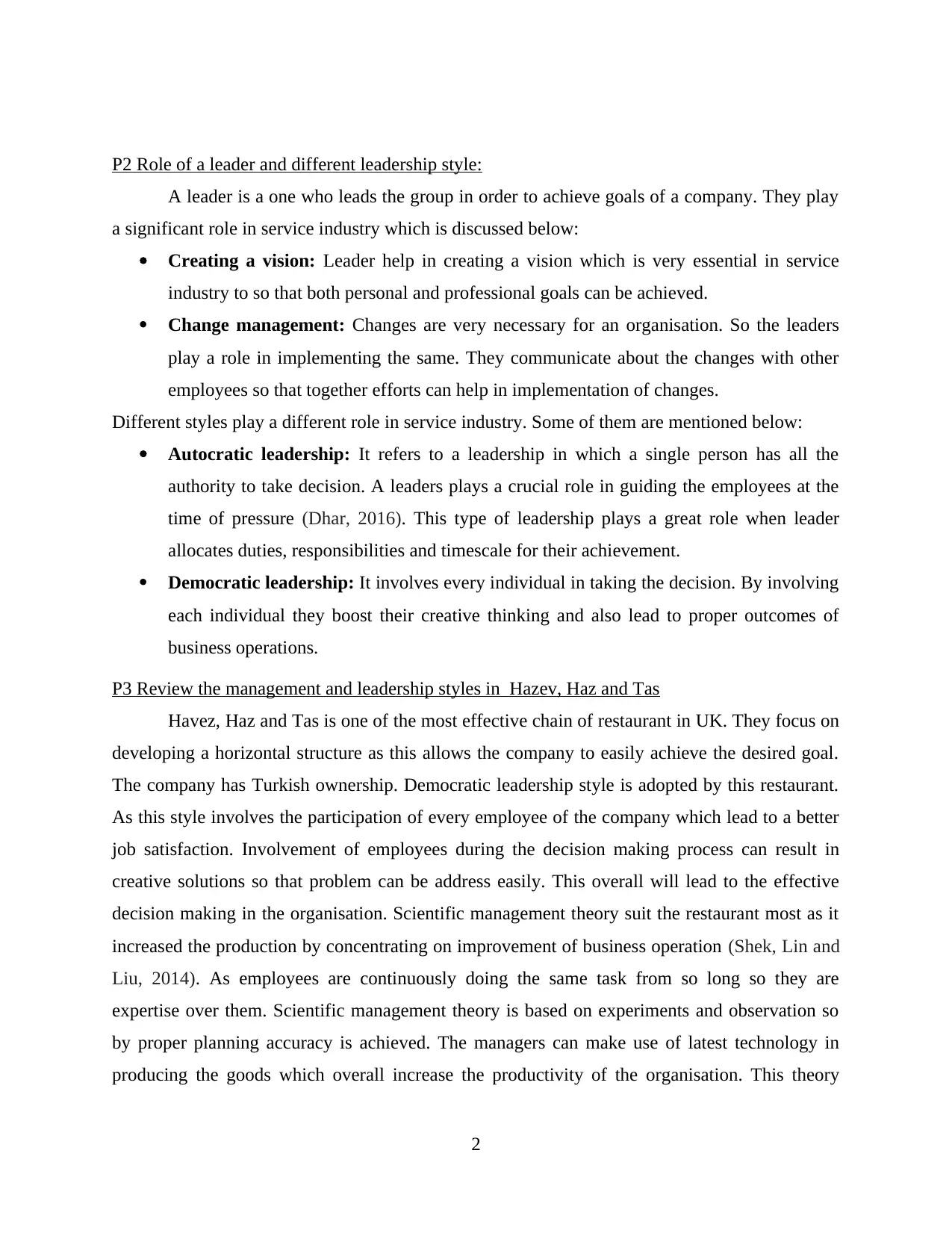
P2 Role of a leader and different leadership style:
A leader is a one who leads the group in order to achieve goals of a company. They play
a significant role in service industry which is discussed below:
Creating a vision: Leader help in creating a vision which is very essential in service
industry to so that both personal and professional goals can be achieved.
Change management: Changes are very necessary for an organisation. So the leaders
play a role in implementing the same. They communicate about the changes with other
employees so that together efforts can help in implementation of changes.
Different styles play a different role in service industry. Some of them are mentioned below:
Autocratic leadership: It refers to a leadership in which a single person has all the
authority to take decision. A leaders plays a crucial role in guiding the employees at the
time of pressure (Dhar, 2016). This type of leadership plays a great role when leader
allocates duties, responsibilities and timescale for their achievement.
Democratic leadership: It involves every individual in taking the decision. By involving
each individual they boost their creative thinking and also lead to proper outcomes of
business operations.
P3 Review the management and leadership styles in Hazev, Haz and Tas
Havez, Haz and Tas is one of the most effective chain of restaurant in UK. They focus on
developing a horizontal structure as this allows the company to easily achieve the desired goal.
The company has Turkish ownership. Democratic leadership style is adopted by this restaurant.
As this style involves the participation of every employee of the company which lead to a better
job satisfaction. Involvement of employees during the decision making process can result in
creative solutions so that problem can be address easily. This overall will lead to the effective
decision making in the organisation. Scientific management theory suit the restaurant most as it
increased the production by concentrating on improvement of business operation (Shek, Lin and
Liu, 2014). As employees are continuously doing the same task from so long so they are
expertise over them. Scientific management theory is based on experiments and observation so
by proper planning accuracy is achieved. The managers can make use of latest technology in
producing the goods which overall increase the productivity of the organisation. This theory
2
A leader is a one who leads the group in order to achieve goals of a company. They play
a significant role in service industry which is discussed below:
Creating a vision: Leader help in creating a vision which is very essential in service
industry to so that both personal and professional goals can be achieved.
Change management: Changes are very necessary for an organisation. So the leaders
play a role in implementing the same. They communicate about the changes with other
employees so that together efforts can help in implementation of changes.
Different styles play a different role in service industry. Some of them are mentioned below:
Autocratic leadership: It refers to a leadership in which a single person has all the
authority to take decision. A leaders plays a crucial role in guiding the employees at the
time of pressure (Dhar, 2016). This type of leadership plays a great role when leader
allocates duties, responsibilities and timescale for their achievement.
Democratic leadership: It involves every individual in taking the decision. By involving
each individual they boost their creative thinking and also lead to proper outcomes of
business operations.
P3 Review the management and leadership styles in Hazev, Haz and Tas
Havez, Haz and Tas is one of the most effective chain of restaurant in UK. They focus on
developing a horizontal structure as this allows the company to easily achieve the desired goal.
The company has Turkish ownership. Democratic leadership style is adopted by this restaurant.
As this style involves the participation of every employee of the company which lead to a better
job satisfaction. Involvement of employees during the decision making process can result in
creative solutions so that problem can be address easily. This overall will lead to the effective
decision making in the organisation. Scientific management theory suit the restaurant most as it
increased the production by concentrating on improvement of business operation (Shek, Lin and
Liu, 2014). As employees are continuously doing the same task from so long so they are
expertise over them. Scientific management theory is based on experiments and observation so
by proper planning accuracy is achieved. The managers can make use of latest technology in
producing the goods which overall increase the productivity of the organisation. This theory
2
Paraphrase This Document
Need a fresh take? Get an instant paraphrase of this document with our AI Paraphraser
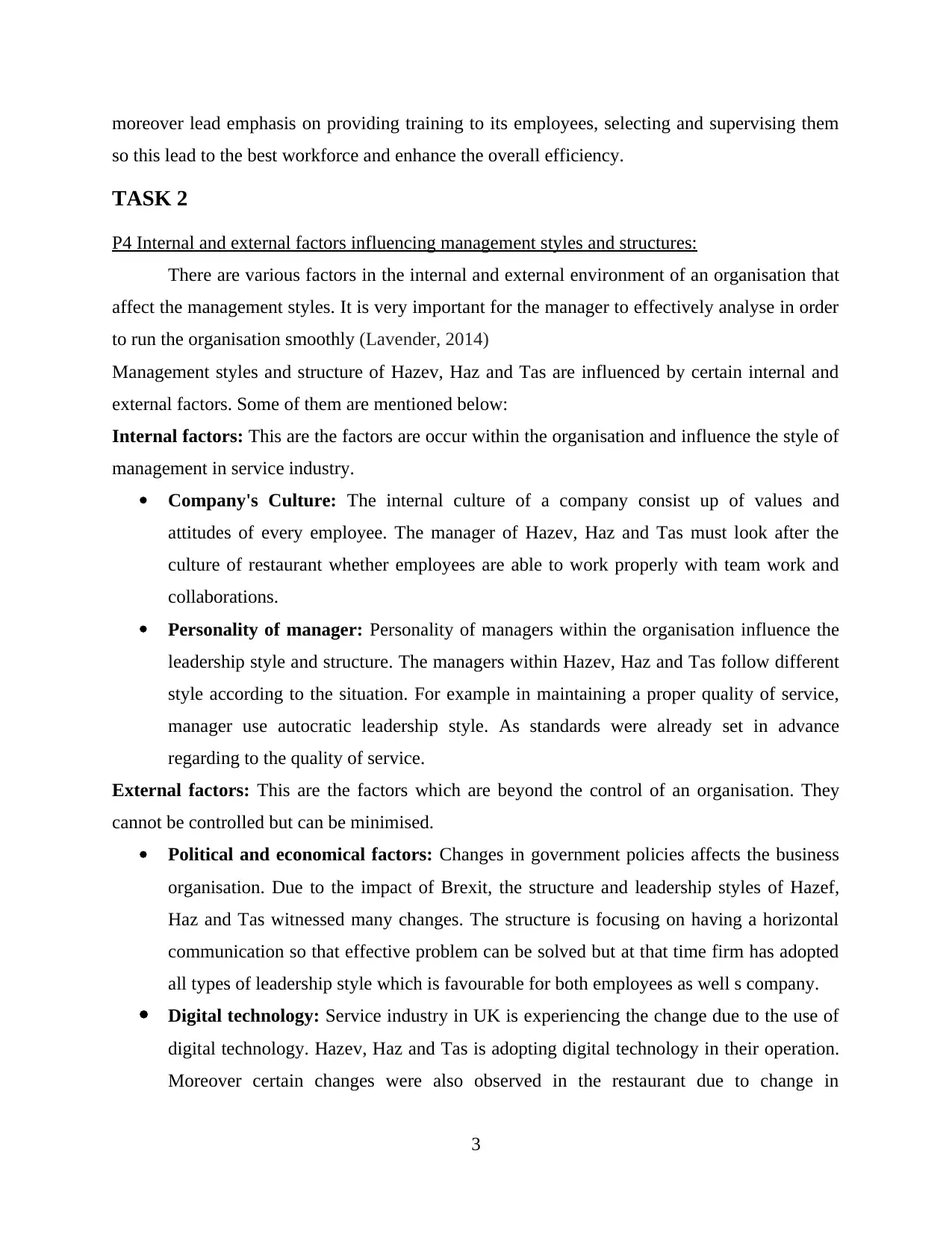
moreover lead emphasis on providing training to its employees, selecting and supervising them
so this lead to the best workforce and enhance the overall efficiency.
TASK 2
P4 Internal and external factors influencing management styles and structures:
There are various factors in the internal and external environment of an organisation that
affect the management styles. It is very important for the manager to effectively analyse in order
to run the organisation smoothly (Lavender, 2014)
Management styles and structure of Hazev, Haz and Tas are influenced by certain internal and
external factors. Some of them are mentioned below:
Internal factors: This are the factors are occur within the organisation and influence the style of
management in service industry.
Company's Culture: The internal culture of a company consist up of values and
attitudes of every employee. The manager of Hazev, Haz and Tas must look after the
culture of restaurant whether employees are able to work properly with team work and
collaborations.
Personality of manager: Personality of managers within the organisation influence the
leadership style and structure. The managers within Hazev, Haz and Tas follow different
style according to the situation. For example in maintaining a proper quality of service,
manager use autocratic leadership style. As standards were already set in advance
regarding to the quality of service.
External factors: This are the factors which are beyond the control of an organisation. They
cannot be controlled but can be minimised.
Political and economical factors: Changes in government policies affects the business
organisation. Due to the impact of Brexit, the structure and leadership styles of Hazef,
Haz and Tas witnessed many changes. The structure is focusing on having a horizontal
communication so that effective problem can be solved but at that time firm has adopted
all types of leadership style which is favourable for both employees as well s company.
Digital technology: Service industry in UK is experiencing the change due to the use of
digital technology. Hazev, Haz and Tas is adopting digital technology in their operation.
Moreover certain changes were also observed in the restaurant due to change in
3
so this lead to the best workforce and enhance the overall efficiency.
TASK 2
P4 Internal and external factors influencing management styles and structures:
There are various factors in the internal and external environment of an organisation that
affect the management styles. It is very important for the manager to effectively analyse in order
to run the organisation smoothly (Lavender, 2014)
Management styles and structure of Hazev, Haz and Tas are influenced by certain internal and
external factors. Some of them are mentioned below:
Internal factors: This are the factors are occur within the organisation and influence the style of
management in service industry.
Company's Culture: The internal culture of a company consist up of values and
attitudes of every employee. The manager of Hazev, Haz and Tas must look after the
culture of restaurant whether employees are able to work properly with team work and
collaborations.
Personality of manager: Personality of managers within the organisation influence the
leadership style and structure. The managers within Hazev, Haz and Tas follow different
style according to the situation. For example in maintaining a proper quality of service,
manager use autocratic leadership style. As standards were already set in advance
regarding to the quality of service.
External factors: This are the factors which are beyond the control of an organisation. They
cannot be controlled but can be minimised.
Political and economical factors: Changes in government policies affects the business
organisation. Due to the impact of Brexit, the structure and leadership styles of Hazef,
Haz and Tas witnessed many changes. The structure is focusing on having a horizontal
communication so that effective problem can be solved but at that time firm has adopted
all types of leadership style which is favourable for both employees as well s company.
Digital technology: Service industry in UK is experiencing the change due to the use of
digital technology. Hazev, Haz and Tas is adopting digital technology in their operation.
Moreover certain changes were also observed in the restaurant due to change in
3
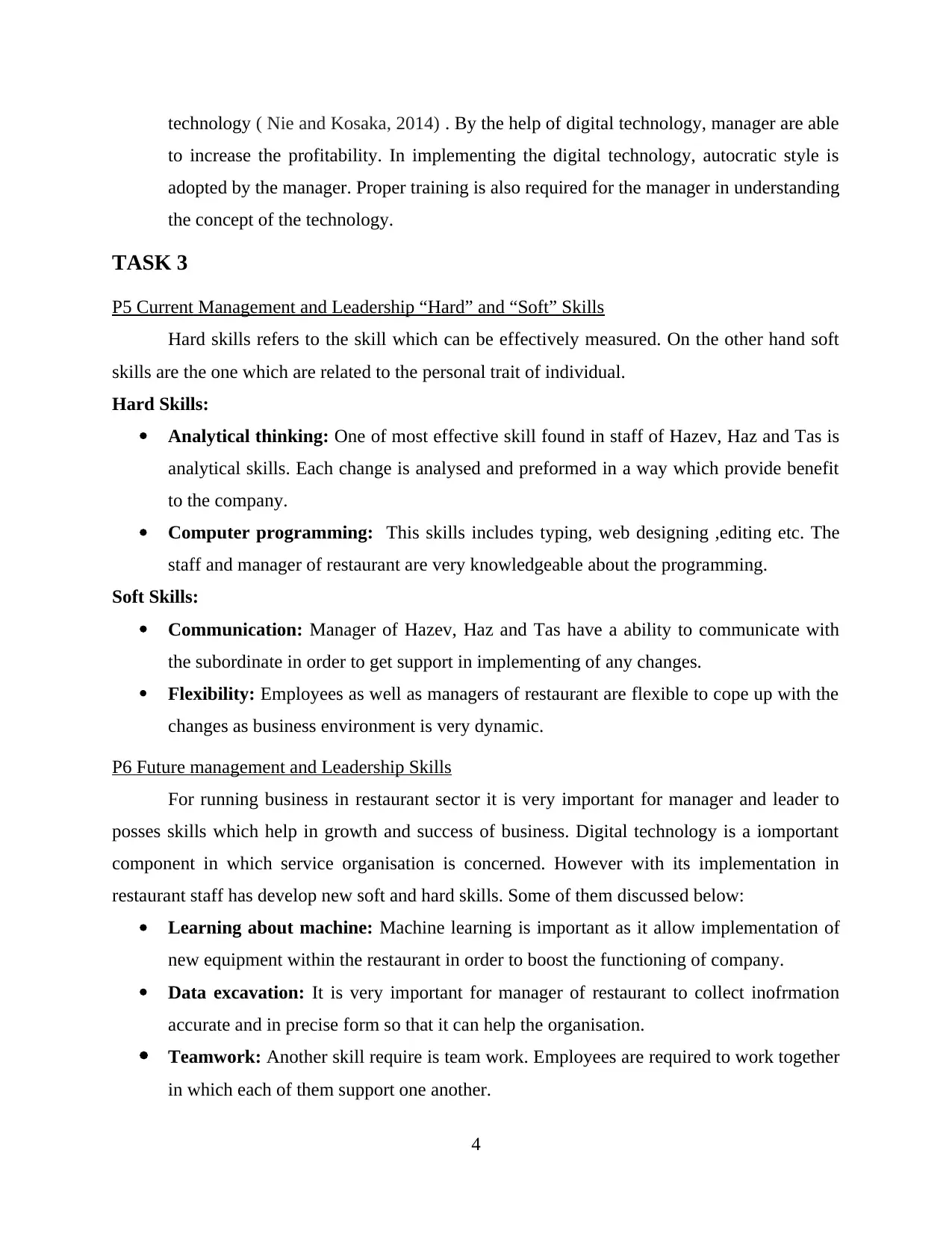
technology ( Nie and Kosaka, 2014) . By the help of digital technology, manager are able
to increase the profitability. In implementing the digital technology, autocratic style is
adopted by the manager. Proper training is also required for the manager in understanding
the concept of the technology.
TASK 3
P5 Current Management and Leadership “Hard” and “Soft” Skills
Hard skills refers to the skill which can be effectively measured. On the other hand soft
skills are the one which are related to the personal trait of individual.
Hard Skills:
Analytical thinking: One of most effective skill found in staff of Hazev, Haz and Tas is
analytical skills. Each change is analysed and preformed in a way which provide benefit
to the company.
Computer programming: This skills includes typing, web designing ,editing etc. The
staff and manager of restaurant are very knowledgeable about the programming.
Soft Skills:
Communication: Manager of Hazev, Haz and Tas have a ability to communicate with
the subordinate in order to get support in implementing of any changes.
Flexibility: Employees as well as managers of restaurant are flexible to cope up with the
changes as business environment is very dynamic.
P6 Future management and Leadership Skills
For running business in restaurant sector it is very important for manager and leader to
posses skills which help in growth and success of business. Digital technology is a iomportant
component in which service organisation is concerned. However with its implementation in
restaurant staff has develop new soft and hard skills. Some of them discussed below:
Learning about machine: Machine learning is important as it allow implementation of
new equipment within the restaurant in order to boost the functioning of company.
Data excavation: It is very important for manager of restaurant to collect inofrmation
accurate and in precise form so that it can help the organisation.
Teamwork: Another skill require is team work. Employees are required to work together
in which each of them support one another.
4
to increase the profitability. In implementing the digital technology, autocratic style is
adopted by the manager. Proper training is also required for the manager in understanding
the concept of the technology.
TASK 3
P5 Current Management and Leadership “Hard” and “Soft” Skills
Hard skills refers to the skill which can be effectively measured. On the other hand soft
skills are the one which are related to the personal trait of individual.
Hard Skills:
Analytical thinking: One of most effective skill found in staff of Hazev, Haz and Tas is
analytical skills. Each change is analysed and preformed in a way which provide benefit
to the company.
Computer programming: This skills includes typing, web designing ,editing etc. The
staff and manager of restaurant are very knowledgeable about the programming.
Soft Skills:
Communication: Manager of Hazev, Haz and Tas have a ability to communicate with
the subordinate in order to get support in implementing of any changes.
Flexibility: Employees as well as managers of restaurant are flexible to cope up with the
changes as business environment is very dynamic.
P6 Future management and Leadership Skills
For running business in restaurant sector it is very important for manager and leader to
posses skills which help in growth and success of business. Digital technology is a iomportant
component in which service organisation is concerned. However with its implementation in
restaurant staff has develop new soft and hard skills. Some of them discussed below:
Learning about machine: Machine learning is important as it allow implementation of
new equipment within the restaurant in order to boost the functioning of company.
Data excavation: It is very important for manager of restaurant to collect inofrmation
accurate and in precise form so that it can help the organisation.
Teamwork: Another skill require is team work. Employees are required to work together
in which each of them support one another.
4
⊘ This is a preview!⊘
Do you want full access?
Subscribe today to unlock all pages.

Trusted by 1+ million students worldwide
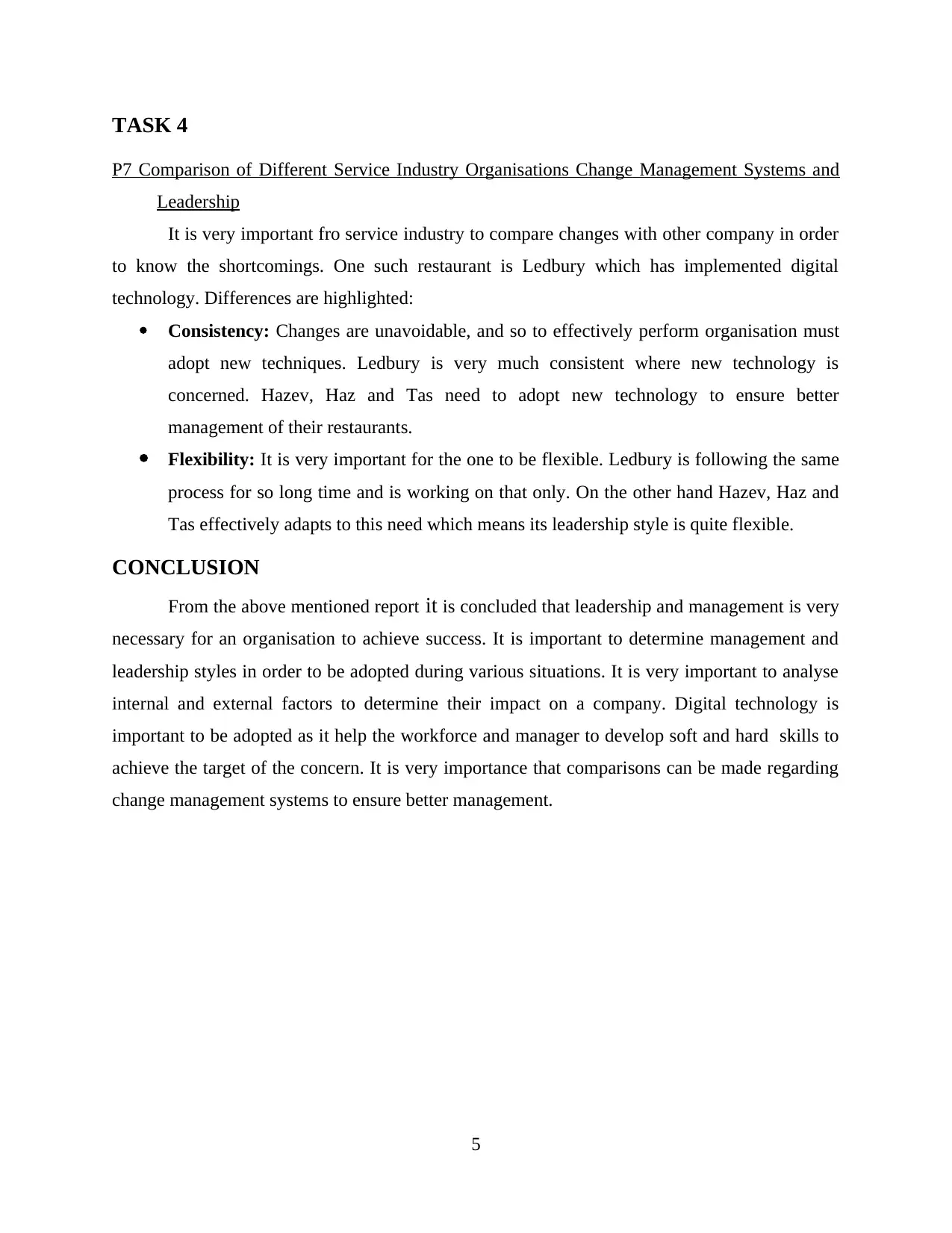
TASK 4
P7 Comparison of Different Service Industry Organisations Change Management Systems and
Leadership
It is very important fro service industry to compare changes with other company in order
to know the shortcomings. One such restaurant is Ledbury which has implemented digital
technology. Differences are highlighted:
Consistency: Changes are unavoidable, and so to effectively perform organisation must
adopt new techniques. Ledbury is very much consistent where new technology is
concerned. Hazev, Haz and Tas need to adopt new technology to ensure better
management of their restaurants.
Flexibility: It is very important for the one to be flexible. Ledbury is following the same
process for so long time and is working on that only. On the other hand Hazev, Haz and
Tas effectively adapts to this need which means its leadership style is quite flexible.
CONCLUSION
From the above mentioned report it is concluded that leadership and management is very
necessary for an organisation to achieve success. It is important to determine management and
leadership styles in order to be adopted during various situations. It is very important to analyse
internal and external factors to determine their impact on a company. Digital technology is
important to be adopted as it help the workforce and manager to develop soft and hard skills to
achieve the target of the concern. It is very importance that comparisons can be made regarding
change management systems to ensure better management.
5
P7 Comparison of Different Service Industry Organisations Change Management Systems and
Leadership
It is very important fro service industry to compare changes with other company in order
to know the shortcomings. One such restaurant is Ledbury which has implemented digital
technology. Differences are highlighted:
Consistency: Changes are unavoidable, and so to effectively perform organisation must
adopt new techniques. Ledbury is very much consistent where new technology is
concerned. Hazev, Haz and Tas need to adopt new technology to ensure better
management of their restaurants.
Flexibility: It is very important for the one to be flexible. Ledbury is following the same
process for so long time and is working on that only. On the other hand Hazev, Haz and
Tas effectively adapts to this need which means its leadership style is quite flexible.
CONCLUSION
From the above mentioned report it is concluded that leadership and management is very
necessary for an organisation to achieve success. It is important to determine management and
leadership styles in order to be adopted during various situations. It is very important to analyse
internal and external factors to determine their impact on a company. Digital technology is
important to be adopted as it help the workforce and manager to develop soft and hard skills to
achieve the target of the concern. It is very importance that comparisons can be made regarding
change management systems to ensure better management.
5
Paraphrase This Document
Need a fresh take? Get an instant paraphrase of this document with our AI Paraphraser
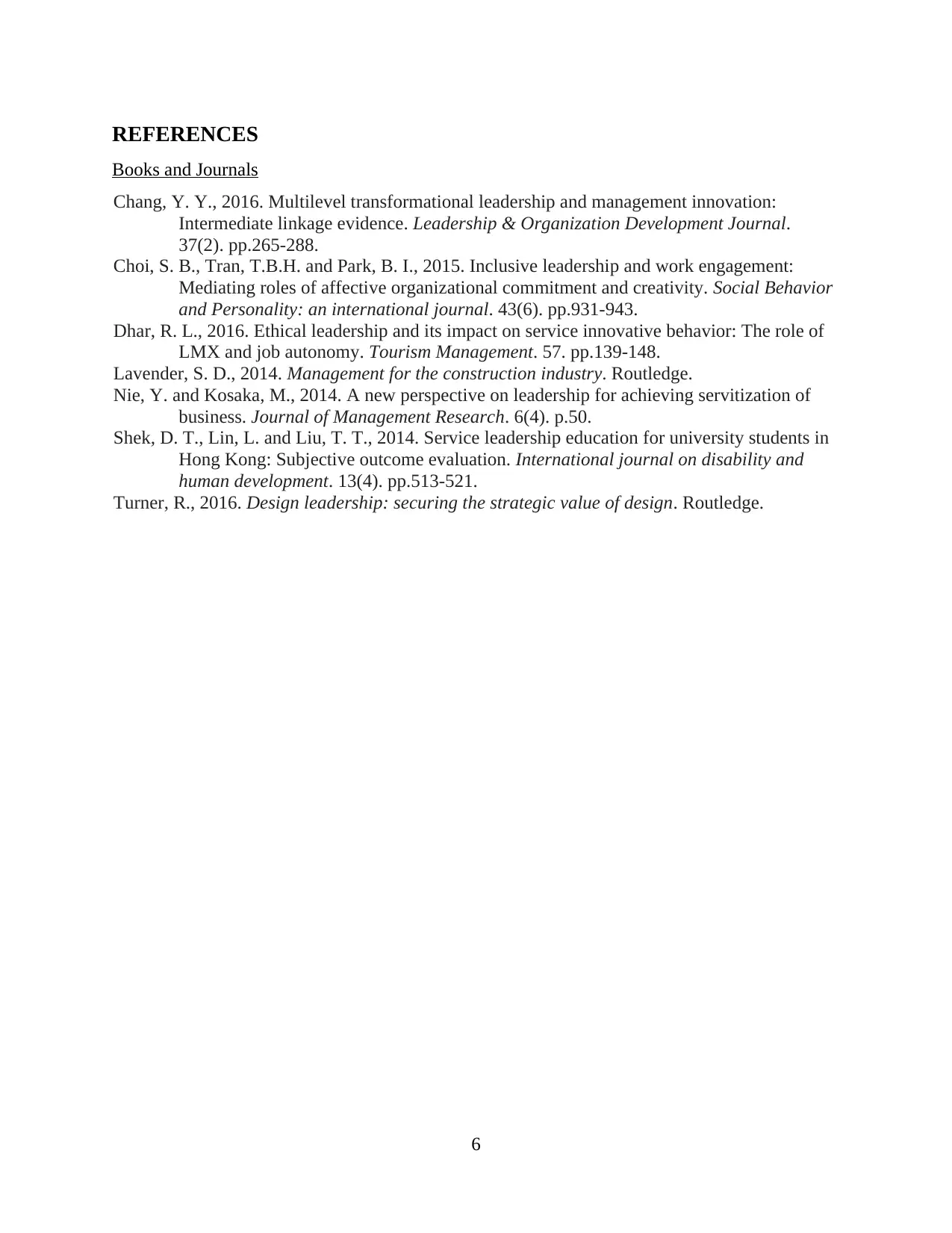
REFERENCES
Books and Journals
Chang, Y. Y., 2016. Multilevel transformational leadership and management innovation:
Intermediate linkage evidence. Leadership & Organization Development Journal.
37(2). pp.265-288.
Choi, S. B., Tran, T.B.H. and Park, B. I., 2015. Inclusive leadership and work engagement:
Mediating roles of affective organizational commitment and creativity. Social Behavior
and Personality: an international journal. 43(6). pp.931-943.
Dhar, R. L., 2016. Ethical leadership and its impact on service innovative behavior: The role of
LMX and job autonomy. Tourism Management. 57. pp.139-148.
Lavender, S. D., 2014. Management for the construction industry. Routledge.
Nie, Y. and Kosaka, M., 2014. A new perspective on leadership for achieving servitization of
business. Journal of Management Research. 6(4). p.50.
Shek, D. T., Lin, L. and Liu, T. T., 2014. Service leadership education for university students in
Hong Kong: Subjective outcome evaluation. International journal on disability and
human development. 13(4). pp.513-521.
Turner, R., 2016. Design leadership: securing the strategic value of design. Routledge.
6
Books and Journals
Chang, Y. Y., 2016. Multilevel transformational leadership and management innovation:
Intermediate linkage evidence. Leadership & Organization Development Journal.
37(2). pp.265-288.
Choi, S. B., Tran, T.B.H. and Park, B. I., 2015. Inclusive leadership and work engagement:
Mediating roles of affective organizational commitment and creativity. Social Behavior
and Personality: an international journal. 43(6). pp.931-943.
Dhar, R. L., 2016. Ethical leadership and its impact on service innovative behavior: The role of
LMX and job autonomy. Tourism Management. 57. pp.139-148.
Lavender, S. D., 2014. Management for the construction industry. Routledge.
Nie, Y. and Kosaka, M., 2014. A new perspective on leadership for achieving servitization of
business. Journal of Management Research. 6(4). p.50.
Shek, D. T., Lin, L. and Liu, T. T., 2014. Service leadership education for university students in
Hong Kong: Subjective outcome evaluation. International journal on disability and
human development. 13(4). pp.513-521.
Turner, R., 2016. Design leadership: securing the strategic value of design. Routledge.
6
1 out of 8
Related Documents
Your All-in-One AI-Powered Toolkit for Academic Success.
+13062052269
info@desklib.com
Available 24*7 on WhatsApp / Email
![[object Object]](/_next/static/media/star-bottom.7253800d.svg)
Unlock your academic potential
Copyright © 2020–2026 A2Z Services. All Rights Reserved. Developed and managed by ZUCOL.





